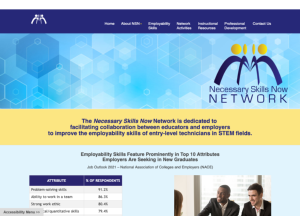The Necessary Skills Now Network: Integrating Employability Skills Development into Technician Education Across STEM Disciplines

For several decades, employers in high-tech fields have complained that entry-level employees often lack "employability skills," which are also called "soft skills." These skills are the non-technical skills necessary for success in the workplace, including working in teams, problem solving, verbal communication, written communication, dependability/work ethic, and planning/organizing. Reports have called on colleges to redesign courses and curricula to address the deficiency in employability skills, and many projects have been launched to do so, often with a focus on a particular discipline. As a new Advanced Technological Education (ATE) Coordination Network, the Necessary Skills Now Network will foster the collaboration of community and technical college faculty with business/industry partners to integrate employability skills into technician education programs across the STEM disciplines.
The Necessary Skills Now Network will assist community and technical colleges in sharing resources, exploring new teaching methods, and collaborating with employers to help students improve their mastery of employability skills. The Network will (1) create an active "community of practice" to exchange ideas, promising practices, research, and employment trends; (2) provide faculty development workshops and courses to support the adoption of effective teaching methods, instructional materials, and learning environments; and (3) create an online portal of open educational resources to improve the development of employability skills among students in technical associate degree programs. The project is led by the Center for Occupational Research and Development and three ATE centers: the South Carolina Advanced Technological Education center (engineering technology), the Center for Systems Security and Information Assurance (cybersecurity), and the Florida Advanced Technological Education center (advanced manufacturing). Through the existing, extensive networks of these partners, the investigators expect to reach over 450 faculty members with workshops, online courses, and on-demand resources and to engage over 300 colleges and 75 companies in community-of-practice activities. Conference presentations, webinars, publications, and social media will further extend awareness of the Network's resources to stakeholders across the STEM disciplines. The overall goal is to develop an environment in which many employers and educators collaborate across roles, technology sectors, and geography to build solutions that will give students the full range of skills needed for working productively after they are hired.

Comments